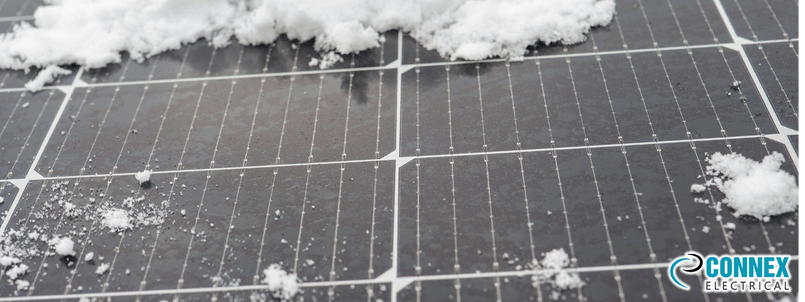Many homeowners invest in solar panels to tap into renewable energy, cut electricity bills, and reduce carbon footprints. While solar panels are known for their efficiency in sunny conditions, questions often arise about their effectiveness during the winter months.
Here, we delve into how solar panels perform when the temperatures drop and the days shorten.
Solar Panels Work in Winter?
Yes, solar panels do work in winter! The common belief that solar panels need hot temperatures to function is a misconception. In reality, solar panels require sunlight, not heat. In fact, cold temperatures can enhance panel performance by increasing the conductivity of the electricity generated.
Factors Influencing Winter Performance
Solar panels’ effectiveness in winter is influenced by several factors:
- Sunlight Exposure: Shorter days mean fewer hours of sunlight, which can reduce the amount of energy panels produce.
- Weather Conditions: Snow cover and heavy cloudiness can block sunlight. However, as long as there is light, solar panels will generate power. Panels are typically installed at an angle, helping snow to slide off more easily, minimizing accumulation.
- Temperature: Cooler temperatures can actually improve solar panel efficiency compared to higher temperatures during summer, which can reduce their efficiency.
Benefits of Winter Solar Panel Use
Winter may seem like an odd time to think about solar power, but it actually has some surprising benefits for solar panel use. Here’s how winter can work to your advantage with solar panels:
1. Improved Efficiency in Cooler Temperatures
Solar panels operate more efficiently in cooler temperatures. Excessive heat can cause solar panels to overheat, leading to a drop in energy production. Winter’s cooler climate keeps panels from overheating, allowing them to work at peak efficiency.
2. Enhanced Performance Due to Sun Reflection on Snow
Snow can act as a reflective surface, bouncing additional sunlight onto the panels. This effect, known as the “albedo effect,” can increase the amount of sunlight that reaches the panels, boosting their performance.
3. Longer Days of Direct Sunlight
While days are shorter in winter, clear, crisp winter skies can produce high levels of sunlight, especially during sunny days. This direct sunlight can be quite effective for energy production.
4. Quick Snow Melt on Panels
Solar panels generate a bit of heat when absorbing sunlight, even in winter, which can cause snow to melt quickly and slide off. Once the snow clears, the panels can continue generating electricity efficiently.
5. Reduced Energy Bills During High Winter Demand
Winter can bring higher electricity bills due to increased heating needs. Using solar energy can help offset these costs, keeping energy expenses lower even during the cold season.
6. Minimal Maintenance Due to Lack of Dust and Debris
Winter months often come with less dust and debris in the air, meaning panels stay cleaner naturally. This reduces the need for frequent cleaning and maintenance.
7. Environmental Benefits All Year-Round
Using solar energy, even in winter, reduces reliance on nonrenewable energy sources and lowers greenhouse gas emissions. This contributes to a greener environment throughout the year.
By understanding and leveraging these winter-specific benefits, solar panel users can continue to reap sustainable energy even during the colder months.
Energy Output in Winter
While it’s true that solar panels generate less energy in winter than in summer, they still produce a significant amount of power. For instance, a typical home solar installation might see a reduction in output by 10% to 25% depending on the geographical location and local weather conditions.
Maximizing Winter Efficiency
To maximize the effectiveness of solar panels during winter, consider the following tips:
- Proper Installation Angle: Ensure your panels are installed at an angle that optimizes sunlight capture during winter months.
- Regular Maintenance: Check and clean your panels regularly to remove snow, debris, and dirt that can block sunlight.
- Use of Solar Batteries: Pairing your solar system with batteries can store excess summer energy for use in winter, balancing the seasonal variations in solar production.
Conclusion
Solar panels are a robust technology designed to operate efficiently across a range of environmental conditions, including winter. The key to optimizing solar panel performance in colder months lies in proper system setup, regular maintenance, and adjusting energy usage patterns to match seasonal production capabilities.
Interested in leveraging solar energy for year-round benefits? Contact Connex Electrical today to explore personalized solar solutions that fit your home’s needs and start your journey towards sustainable and cost-effective energy independence.

